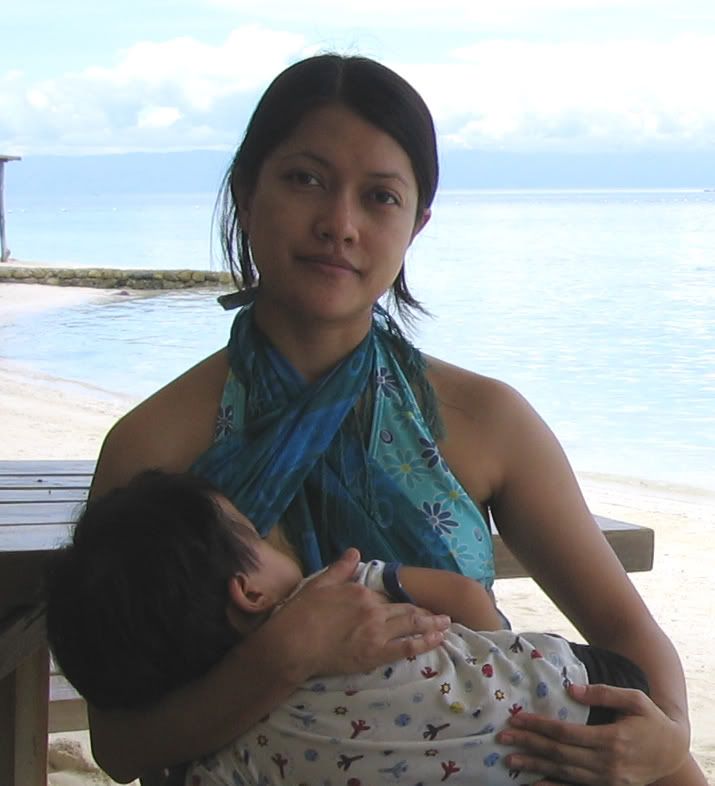But sometimes, I simply have to state a fact: a medical doctor, trained for years in human anatomy, diseases and their treatment, has erred yet again in counseling a mother in the most natural act of breastfeeding.
Just recently, a working mother of a two-month-old was apologetically explaining to me why she was mixed-feeding her baby. She never had enough milk, she says. "Oh, and something happened when my baby was a newborn," she recalls, "My baby had diarrhea. She had a bowel movement after almost every feeding, up to six times a day! So my doctor told me to put her on 'tummy rest'."
"What do you mean, 'tummy rest'?" I had never heard the term before.
The mother explains, "Oh, I stopped breastfeeding for 24 hours. Instead, I gave my baby infant formula."
As you can expect, I could not help myself: "Your doctor was wrong!"
Tummy rest? It was tummy "stress", I protest! Nothing is easier for the baby's tummy to digest than breastmilk (assuming the mother is not eating anything that the baby is allergic to). So instead of giving her baby's tummy a rest, she put her under more stress. "Besides," I say, "your baby was not having diarrhea. It's perfectly normal for a breastfed baby, especially a newborn, to have a bowel movement after each feeding."
The sad part is, this is not the first time I have heard of medical doctors and nurses giving wrong advice to a breastfeeding mom. Here are some other instances I can recall:
- When my second baby was 7 months old, a doctor told me I had to stop breastfeeding because he was going to put me on antibiotics. I asked if he couldn't give me a safe medicine for a lactating mother. Nope, he claimed, and even showed me the entry in PIMS where it says that the medicine wasn't safe for breastfeeding women. "Besides," he said, "at 7 months your baby is only breastfeeding for emotional reasons." Near tears, I consulted an expert in WHO who reassured me that I could continue breastfeeding even while on medication. In fact, the very same medicines prescribed to me are sometimes prescribed to babies, in pediatric formulation, of course.
- One colleague was told by her doctor to stop breastfeeding because she had colds and a fever. "Or else you'll pass the virus on to your child," the doctor warned.
- A new mother was told by nurses to give her baby glucose water, while her breastmilk hadn't yet come in. Fortunately, this first-time mother had read enough breastfeeding books before childbirth to stand her ground and say, "No, thank you, I'm breastfeeding my baby!"
- Another first-time mother, who was having trouble latching her baby on, was advised by hospital staff to pump her milk instead. Today, this mother is a master pumper, pumping enough breastmilk for both her son and a niece. But directly breastfeeding her baby remains a challenge.
Last June, I had the priviledge of meeting Dr. Audrey Naylor, physician and CEO of Wellstart International. Dr. Naylor said that in all her years of training in some of the most prestigious Ivy League universities in the States, she did not learn about breastfeeding at all. Thus, Dr. Naylor founded Wellstart "to advance the knowledge, skills, and ability of health care providers regarding the promotion, protection, and support of optimal infant and maternal health and nutrition from conception through the completion of weaning."
Doctors and other health care providers need to be part of the overall solution to the decline of breastfeeding in the Philippines. Mothers, fathers and other family members regard doctors highly and follow their advice. When doctors give the wrong advice, breastfeeding may be interrupted or come to an end altogether. The consequences are not to be taken lightly. A baby's sustenance in the first years of life has long-term effects that persist into adulthood. And we cannot turn back the hands of time to undo the harm that was done in infancy.
Our babies will never be this age again.

3 comments:
Aaaaah! I can't believe some of this. "Tummy rest?!?" Good thing people like you are around.
Hi Alexis,
I love you and all the things you stand for! I am so grateful that I know you.
Yes, the glucose water incident also happened to me but good thing I stood my ground too!
Breastfeeding rocks!
tell me about it...it's great that *some* people in the medical profession actually ACKNOWLEDGE the fact that there's a gap in their knowledge in breastfeeding, thus having a need for groups such as LATCH. we're trying to work directly with hospitals in order to give pregnant women anticipatory guidance. doctors in medical city, cardinal santos and st lukes have so far acknowledged that gap.
Post a Comment